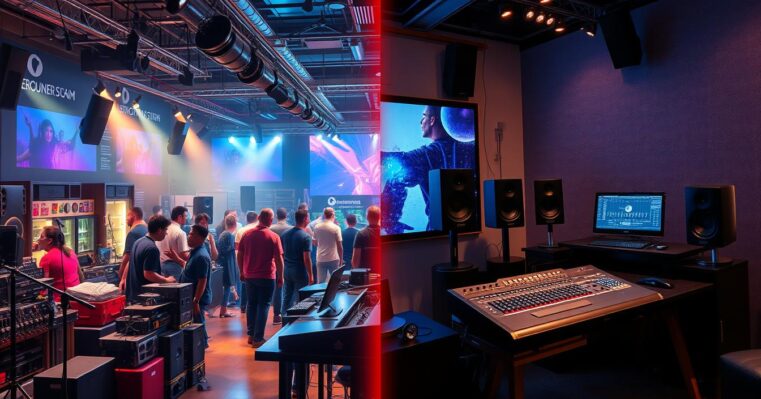Ever thought how the right sound can change an event? Choosing between renting or buying sound equipment is key to a successful event. It's all about the audio-visual technology you pick.
Event planners have a big decision to make. Sound systems can cost from $5,000 to $500,000. Knowing your audio-visual technology is essential.
Whether it's a small meeting or a big conference, the right sound system matters. It's not just about the cost. It's about finding the best fit for your event.
Key Takeaways
- Sound system choices vary widely in cost and complexity
- Rental offers flexibility for infrequent event hosts
- Professional audio equipment requires careful consideration
- Technology and event requirements drive equipment decisions
- Budget plays a crucial role in sound system selection
- Different events demand unique audio solutions
- Technical expertise is key to optimal sound performance
Understanding Event Sound System Basics
Professional audio equipment is key to making events memorable. It's important to know the main parts and specs for clear sound at any event.
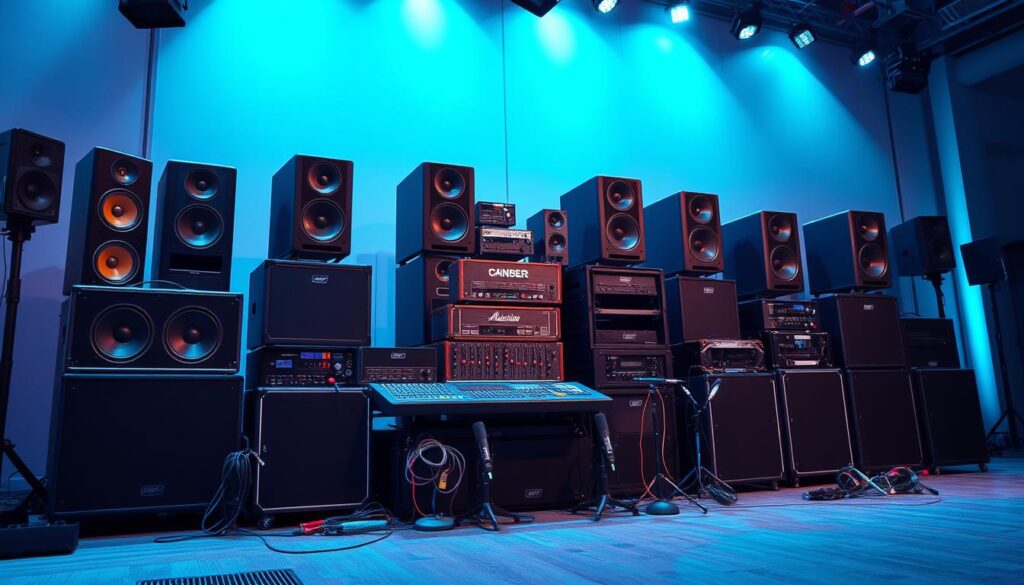
Sound systems have many parts, each chosen for the event. Let's look at the main parts of a pro audio setup:
Essential Sound System Components
- Microphones (wired and wireless)
- Speakers (active and passive)
- Mixing consoles
- Amplifiers
- Subwoofers
Technical Specifications to Consider
When picking a sound system, specs matter a lot. Look at power, frequency, and signal-to-noise ratio for good sound.
| Event Size | Power Requirements | Recommended System |
|---|---|---|
| Small (up to 100 people) | 1,000-2,000W RMS | Compact sound system |
| Medium (up to 300 people) | 3,000-4,000W RMS | Expanded speaker setup |
| Large (up to 600 people) | 8,000-32,000W RMS | Line array systems |
Sound System Applications for Different Events
Each event needs its own audio setup. Wireless microphones are great for talks, and line array systems are best for big shows.
"The right sound system can make or break your event's success." - Audio Professional
Knowing about audio equipment helps you choose the right sound system. Whether it's a meeting or a concert, the right specs ensure great sound.
The Financial Impact of Sound System Decisions
Planning for sound system investments is key. It affects your event budget and future success. A smart budget can boost your profits and efficiency.
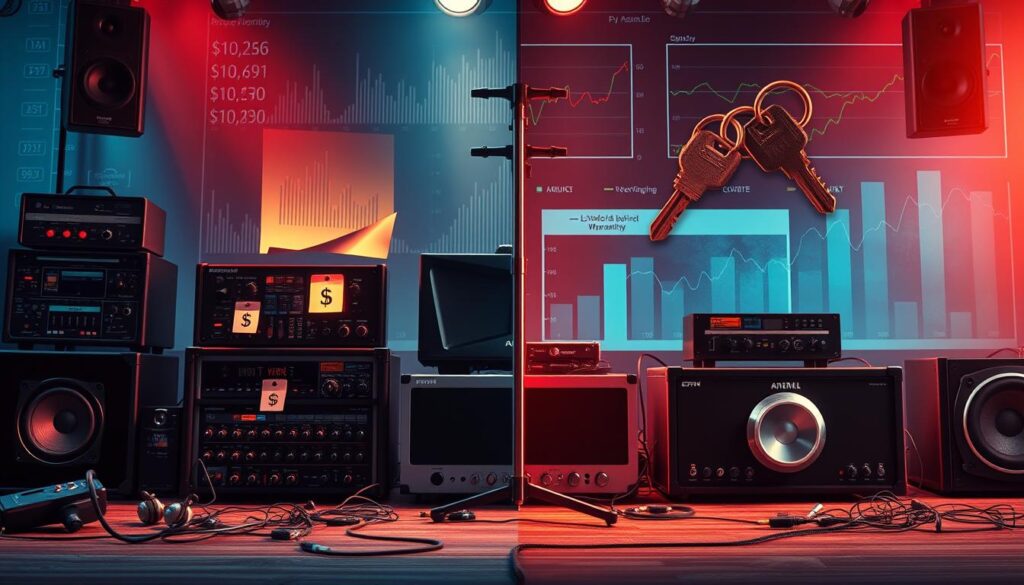
Sound system costs go beyond the upfront price. Experts must look at several financial angles:
- Initial equipment investment
- Maintenance expenses
- Potential revenue generation
- Long-term depreciation
"Smart financial planning transforms sound equipment from an expense into a strategic asset."
Creating a budget for sound systems is all about details. You have to weigh rental versus buying:
| Financial Aspect | Rental Option | Purchase Option |
|---|---|---|
| Initial Investment | Low ($200-$800 daily) | High ($5,000-$15,000) |
| Maintenance Costs | Included in rental | Owner's responsibility |
| Tax Implications | Operational expense | Potential depreciation benefits |
The global event services market is growing fast. Sound equipment rental businesses can make $200,000 to $1 million a year. They can earn 25% to 40% profit, depending on how well they manage and market themselves.
Your financial plan should balance today's costs with tomorrow's gains. Think about how often you'll use the system, what you need technically, and how it might make money for you.
Rental vs Purchase Sound Systems
Choosing between renting or buying sound equipment is a big decision. It affects your event budget and how well the sound system performs.

When looking at sound system investment, several important factors come into play. The cost of renting versus buying is a huge difference.
Initial Investment Considerations
Buying a sound system is a big financial choice. Your decision depends on a few key things:
- Equipment quality and specifications
- How often you'll use it
- How complex the setup is
- Your budget
Long-term Cost Analysis
Looking at costs over time shows different financial effects. Renting might seem cheaper at first, but the ongoing costs can add up fast.
"Strategic sound system decisions balance immediate expenses with long-term financial planning."
Return on Investment Calculations
Calculating ROI involves looking at several things. Here are the main points:
- How often you'll use it
- Costs for upkeep
- How fast the equipment will depreciate
- Any extra money you might make
For events needing special sound setups, buying might be the better deal. Professional sound systems made for consistent quality can be a reliable choice for the long haul.
Your event's specific needs will decide the best way to invest in sound equipment.
Advantages of Renting Sound Equipment

Renting sound equipment is a flexible solution for event planners. It offers more than just saving money. It gives you access to the latest technology without a big financial hit.
"Flexibility is the key to modern event planning, and sound equipment rental delivers precisely that."
Choosing sound equipment rental brings several key benefits:
- Access to latest technology without massive investments
- Professional-grade equipment for every event type
- Scalable solutions tailored to your specific needs
- Comprehensive technical support
Rental services let you customize your audio setup. Whether it's a small meeting or a big festival, you get the right equipment for your event.
| Rental Advantage | Impact on Events |
|---|---|
| Cost-Effectiveness | Reduce upfront equipment expenses |
| Technology Access | Use state-of-the-art sound systems |
| Technical Support | Professional installation and troubleshooting |
| Scalability | Adapt equipment to event size |
Rental services solve storage, transport, and maintenance issues. You get top-notch equipment without long-term costs. This makes renting sound equipment a smart choice for event planners looking for quality and ease.
Benefits of Purchasing Sound Systems
Buying sound systems can really help your business grow. It's better than renting because you save money in the long run. Plus, you get to control your equipment better.
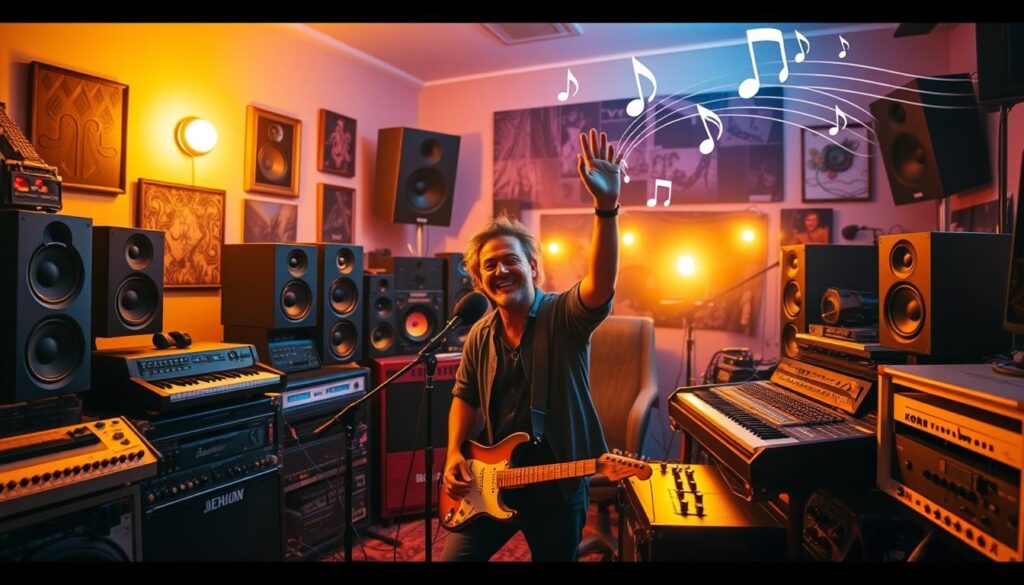
Having your own sound equipment changes how you manage your business. You don't have to rely on rentals anymore. This means you can use your gear whenever you need it.
Asset Ownership Advantages
- Immediate access to professional sound equipment
- Full control over equipment maintenance and quality
- Potential to generate additional revenue through equipment rentals
- Customization of sound systems to match specific event requirements
Tax Implications and Financial Strategy
Buying sound systems can also save you money on taxes. You can write off the cost of the equipment over time. This can really help your business's finances.
"Strategic equipment ownership can transform your event production capabilities and financial performance." - Event Technology Experts
Building Valuable Company Assets
Investing in top-notch sound systems is more than just buying gear. It's building a valuable asset for your company. Over time, this equipment can even increase in value.
It's worth noting that most small and medium businesses rent their equipment. But owning your own can give you a big edge in the market.
Storage and Maintenance Requirements
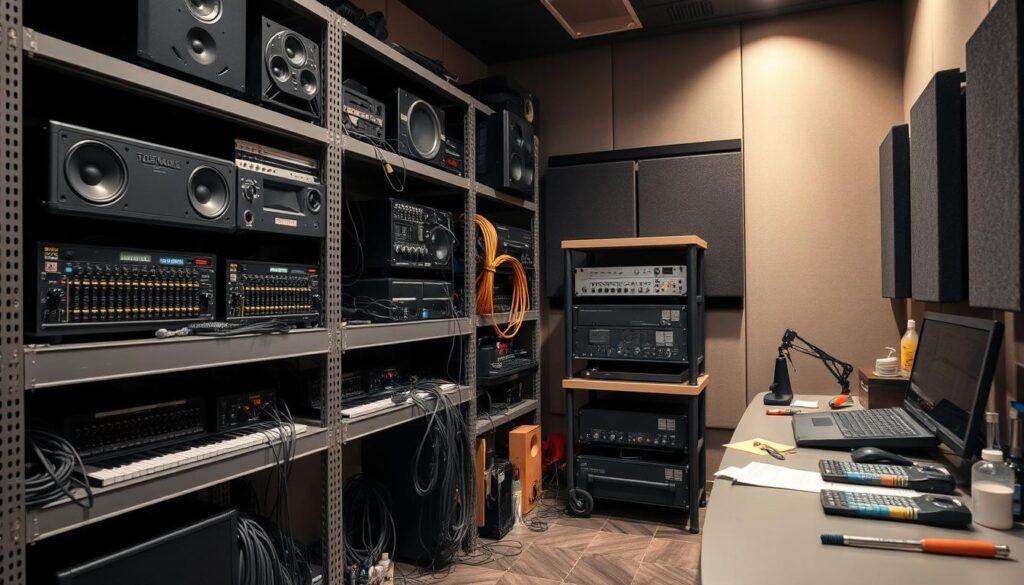
Keeping your sound equipment safe is key to its long-term use. It's not just about where you store it. You need a plan that keeps your audio gear in top shape.
"Effective maintenance procedures can extend the life of your sound system by up to 50%."
When picking a storage spot, think about a few important things:
- Temperature-controlled environments
- Humidity protection
- Dust-free storage areas
- Protective cases and covers
Regular checks and cleanings are part of your maintenance routine. Dust and debris can really hurt sound quality and how well your gear works. Here's a schedule to follow:
- Monthly visual inspections
- Quarterly deep cleaning
- Annual professional technical assessments
Spending time on the right storage and upkeep can save you money and make your sound systems last longer. Good protective cases can keep your gear safe from damage and bad weather.
Each piece of sound equipment needs its own special care. Speakers, mixers, and microphones all have different needs. Look at what the maker says and get expert advice to keep your audio gear in great shape.
Technical Support and Training Considerations
Managing sound systems needs a lot of technical knowledge and planning. Your audio technician training is key to smooth event operations. It helps avoid any problems.
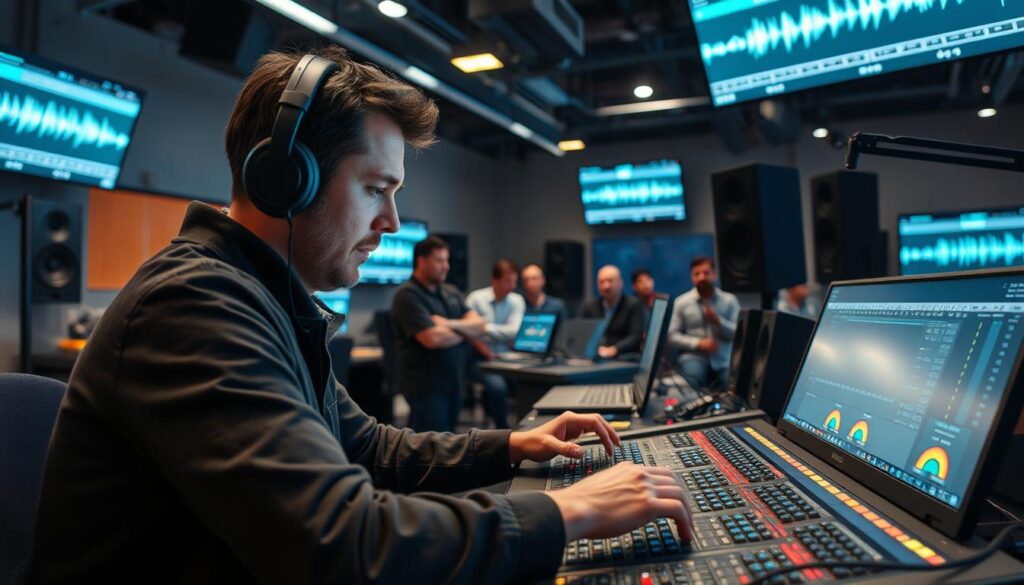
Professional sound system management has many important parts. They need special skills and knowledge.
Staff Training Requirements
Good audio technician training covers several key areas:
- Learning how to use equipment
- Setting up advanced sound systems
- Following safety rules and best practices
- Fixing technical problems quickly
Ongoing Technical Support Needs
"Continuous learning is the cornerstone of exceptional technical performance."
Your technical support plan should include:
- Workshops to improve skills
- Manufacturer certification programs
- Hands-on training sessions
- Access to expert technical help
Troubleshooting Capabilities
It's crucial for audio technicians to have strong troubleshooting skills. Solving problems fast keeps events running smoothly and maintains high standards.
Good technical support means understanding sound system complexities. It's about anticipating issues and solving them quickly and effectively.
Latest Sound System Technologies and Trends
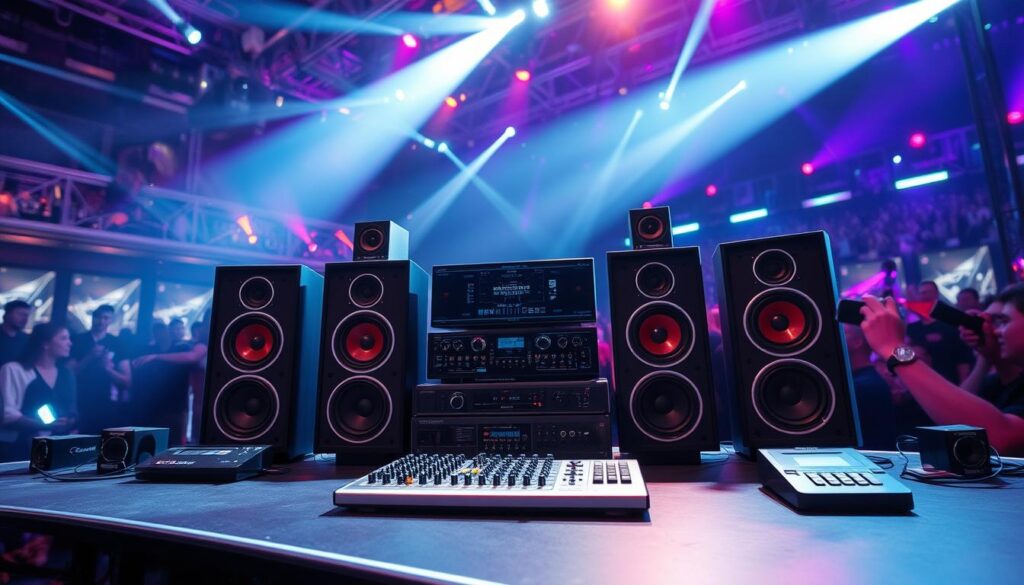
The world of audio technology is changing fast. New digital sound systems and wireless audio solutions are leading the way. The global Audio-Visual equipment industry is expected to hit $389.21 billion by 2030. This means event pros are seeing big tech leaps.
New trends in digital sound systems are changing how we experience events. Some key changes include:
- High-resolution networked audio platforms
- Advanced wireless audio solutions with better signal stability
- Cloud-based sound management systems
- Intelligent audio processing technologies
Wireless audio solutions are making a big impact on event sound. Today's systems offer:
- Seamless connectivity
- Improved signal range
- Better sound quality
- Easier setup
"Technology is transforming sound experiences, making events more immersive and technologically sophisticated." - Audio Technology Expert
The market is pouring money into smart tech. The smart speaker market is set to grow at a 22.2% CAGR by 2030. This shows a lot of innovation in audio tech.
Keeping up with these audio tech trends is key to your event's success. Using the latest digital sound systems and wireless audio solutions can really boost audience engagement and event quality.
Equipment Lifespan and Depreciation
Sound equipment is a big deal for event pros. Knowing about sound equipment lifespan and depreciation helps you make smart choices about your audio gear.
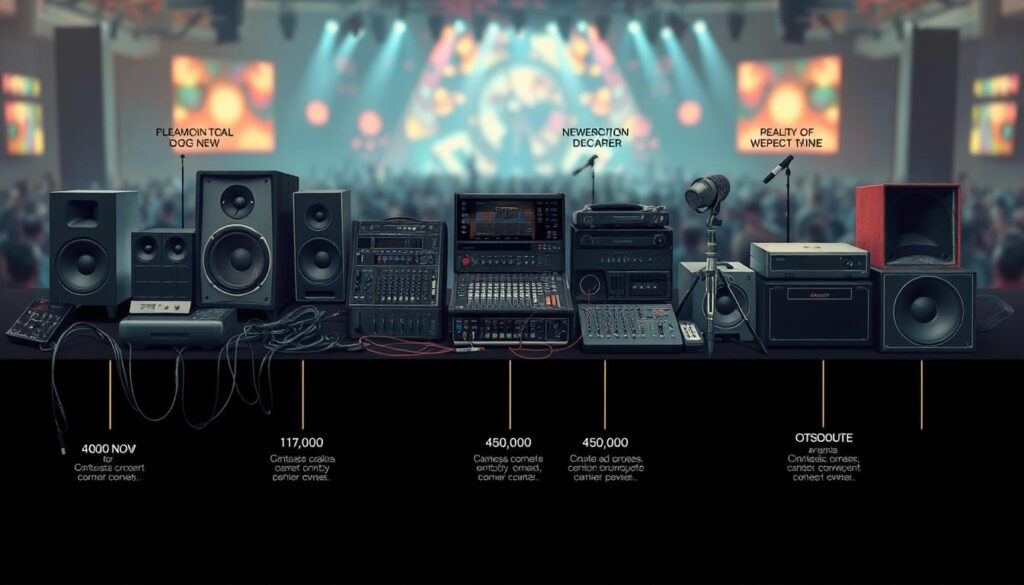
Professional sound systems change fast, which affects their value. Most audio gear loses value quickly in the first few years.
Maintenance Schedules for Longevity
Keeping your sound equipment in good shape is key to making it last longer. Here are some important maintenance tips:
- Do a full check-up on your gear every quarter
- Keep audio parts clean
- Store your gear in a place with stable temperature and humidity
- Fix or replace parts that wear out before they break
Upgrade Planning Strategies
Planning your upgrades wisely keeps you up-to-date with tech while controlling costs.
| Equipment Type | Average Lifespan | Depreciation Rate |
|---|---|---|
| Speakers | 7-10 years | 15-20% annually |
| Mixers | 5-8 years | 20-25% annually |
| Microphones | 10-15 years | 10-15% annually |
Understanding how long your sound equipment lasts and planning upgrades can help you get the most out of your investment. This way, you keep your audio sounding great.
"Invest in maintenance, and your equipment will invest in your success." - Audio Industry Professionals
Event Size and Frequency Considerations
Choosing the right sound system is key. It depends on how big and often your events are. The size and how often you hold events affect what sound system you need.
Different places need different sound setups. Indoor spots usually need smaller systems than big outdoor areas. Think about these important points when setting up your audio:
- Total number of attendees
- Venue dimensions
- Event type and purpose
- Frequency of use
How often you hold events affects whether to buy or rent sound gear. If you have lots of events, buying might save money. But if you only have a few, renting could be better.
"The right sound system transforms an ordinary event into an extraordinary experience."
Choosing a sound system means looking at a few key things:
| Event Size | Recommended Sound System | Frequency Considerations |
|---|---|---|
| Small (50-100 people) | Compact PA system | Monthly or quarterly events |
| Medium (100-500 people) | Moderate line array system | Bi-monthly or weekly events |
| Large (500+ people) | Professional line array with subwoofers | Frequent or daily events |
Your sound system should match your event plans. Planning carefully ensures great sound for all your events.
Understanding Sound System Specifications
Choosing the right sound system is all about knowing the technical details. Your event's success depends on picking audio equipment that meets your needs. It should also provide top-notch sound quality.
When looking at audio specs, focus on three key areas. These areas are crucial for sound system performance:
Power Requirements
Power output shows how well your sound system can fill a space. Look at these important points:
- Wattage ranges for different venue sizes
- Amplification needs based on audience size
- Power distribution among speakers
Coverage Patterns
Knowing how speakers cover an area is key for good sound distribution. Here are some technical requirements:
- Horizontal and vertical sound dispersion
- Speaker placement strategies
- Acoustic characteristics of different venues
Frequency Response
Frequency response affects sound clarity and quality. Professional sound systems usually have:
- Wide frequency ranges (20 Hz - 20 kHz)
- Balanced sound reproduction
- Minimal distortion at various volume levels
"Knowing your audio specifications is the first step to creating an unforgettable sound experience."
By carefully looking at these technical requirements, you can pick a sound system. It will deliver clear and high-quality audio for any event.
Budget Planning and Cost Management
Event budgeting is all about smart financial planning. It helps you get the most out of your sound system. Knowing how to control costs is key to making choices that are both quality and affordable.
- Initial equipment investment ranges from $50,000 to $200,000
- Annual maintenance costs typically represent 10-15% of initial purchase price
- Comprehensive insurance coverage ranges between $2,000 to $20,000 annually
"Smart financial planning transforms sound equipment from an expense into a strategic asset."
Your event budgeting should include a detailed cost analysis. It's not just about cutting costs. It's about using resources wisely.
| Cost Category | Estimated Range | Strategic Considerations |
|---|---|---|
| Equipment Purchase | $50,000 - $200,000 | Long-term ownership vs rental options |
| Annual Maintenance | $5,000 - $30,000 | Regular upkeep prevents costly replacements |
| Technical Support | $30,000 - $100,000 | Skilled team ensures equipment performance |
Cost control strategies should include using equipment well, getting good deals from suppliers, and planning for future tech upgrades.
Insurance and Liability Considerations
Protecting your sound equipment is key to managing risks. Getting equipment insurance is vital to protect your audio investments from financial loss.
Different businesses need sound gear insurance, such as:
- Concert venues
- Live music facilities
- Recording studios
- Event organizers
- Educational institutions
Liability coverage is crucial for sound system risks. Insurance policies cover many important scenarios, like:
- Fire damage
- Theft
- Vandalism
- Accidental damage
- Transportation-related incidents
"Comprehensive insurance is not an expense, but an investment in your professional equipment and peace of mind."
When managing risks, evaluate your sound equipment's total value. Insurance policies offer two main types of coverage:
| Coverage Type | Description |
|---|---|
| Scheduled Limits | Specific protection for high-value items |
| Unscheduled Limits | General coverage for multiple equipment pieces |
Insurance costs depend on equipment value, coverage, and policy length. Professional sound system operators should carefully assess their specific needs to select appropriate protection.
Transportation and Logistics
Getting equipment to the event on time is key for a great sound system. Event managers know that how fast you set up can affect the sound quality.
Shipping sound gear needs a lot of planning. Your prep work is what makes the audio setup go smoothly.
Shipping and Handling Requirements
When moving sound equipment, you must handle it carefully. Here are some important tips:
- Use padded, shock-resistant cases for speakers and audio components
- Implement climate-controlled transportation for sensitive electronics
- Develop detailed inventory tracking for each equipment piece
Setup and Teardown Procedures
Having a clear setup plan can save a lot of time. Professional teams use a structured method to set up quickly and efficiently.
| Event Size | Setup Time | Sound System Power |
|---|---|---|
| Small (Up to 100 people) | 2-3 hours | 8,000-10,000W RMS |
| Medium (Up to 300 people) | 4-5 hours | 10,000-16,000W RMS |
| Large (Up to 600 people) | 6-8 hours | 16,000-32,000W RMS |
"Preparation is the key to successful event sound management." - Audio Engineering Professional
Remember, always plan for extra time. You never know what technical issues or venue needs might pop up.
Quality and Performance Factors
Creating an unforgettable event experience starts with sound quality. How well your audio performs affects how people enjoy the event. Professional sound systems need careful thought about technical and environmental factors.
Several factors impact sound quality:
- Speaker placement and configuration
- Room acoustics and environmental conditions
- Equipment calibration and technical expertise
- Signal processing and audio clarity
Different events need different sound system setups. A wedding and a corporate conference or music festival require unique strategies.
"Great sound is invisible - it should enhance the experience without drawing attention to itself."
Key technical aspects for top-notch sound quality include:
| Performance Factor | Impact on Audio Experience |
|---|---|
| Frequency Response | Ensures balanced audio across different sound ranges |
| Signal-to-Noise Ratio | Minimizes unwanted background interference |
| Dynamic Range | Provides clear sound at various volume levels |
Knowing these factors helps choose sound systems that make events unforgettable. Professional audio equipment greatly improves audience engagement and event satisfaction.
Conclusion
Your event planning success depends on smart sound system choices. Whether renting or buying, knowing how to pick audio equipment is key. The right choice can greatly improve your event's sound quality and keep costs down.
Professional sound systems are very flexible for event planners. Renting lets you use the latest tech without a big upfront cost. This way, you can tailor the sound for each event, making it unforgettable for your guests.
When picking a sound system, think about how often you'll use it, your budget, and support needs. Companies like Rentocart offer flexible rentals that save you from maintenance headaches. Your aim is to find a balance between great sound and keeping costs in check.
Good sound system choices help event planners create amazing audio experiences. Be flexible, do your homework, and focus on quality. This way, your events will be remembered for their incredible sound.
FAQ
What are the main components of a professional sound system?
A professional sound system has microphones, speakers, amplifiers, and mixing consoles. These parts work together to capture, process, and play back audio well. They're used for events like corporate meetings and live concerts.
How do I decide between renting or buying sound equipment?
Choosing between renting and buying depends on several things. Consider how often you'll use the equipment, your budget, and how much space you have. Renting gives you flexibility and access to new tech. Buying lets you control everything and can save money over time if you use it a lot.
What technical specifications should I consider when choosing a sound system?
Look at power output, frequency response, signal-to-noise ratio, and coverage patterns. These specs affect how well the system performs and sounds. They help ensure it meets your event's needs.
What are the maintenance requirements for sound equipment?
Maintaining sound equipment means cleaning, testing, and calibrating it regularly. Protect it from damage, store it right, and do routine checks. This keeps it working well and lasts longer.
How do current technologies impact sound system choices?
New tech like digital mixing consoles, wireless audio, and network systems change event sound. They improve sound quality, make things more efficient, and offer better audio management.
What insurance considerations are important for sound equipment?
You'll need insurance for damage, theft, and liability. Whether you rent or own, good insurance protects your investment. It covers risks during transport and setup.
How do I determine the right sound system for different event sizes?
Think about the venue size, acoustics, and event type. Scaling your sound system needs careful planning. This ensures great audio for all audience sizes.
What are the financial implications of sound system ownership?
Buying a sound system means an initial cost, ongoing maintenance, and tax benefits through depreciation. Calculate the total cost and any revenue from your equipment.
How important is staff training for sound system management?
Training your team is key for using the equipment right, fixing problems, and maintenance. They should know how to operate, set up, and solve issues. This ensures events run smoothly.
When should I consider upgrading my sound equipment?
Upgrade when your system is outdated, has frequent issues, or doesn't meet your event needs anymore. This usually happens every 3-5 years with new tech.

